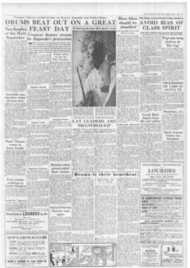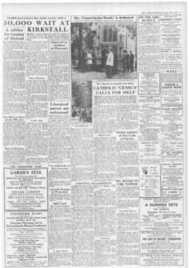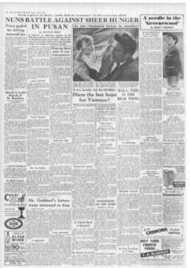Page 2, 2nd July 1954
Page 2

Report an error
Noticed an error on this page?If you've noticed an error in this article please click here to report it.
Tags
Share
Related articles
Innovations Not Purple Passages Or Factual Analysis?
Ii...
Nuclear War Theologian's Broadside I N The Current Issue...
Is The Controversy Worth While?
Time T End This Lobbying
CATHOLICS AND MODERN WAR
SIR, Your contributor, Fr. F. H. Drinkwater, concludes his statement on the subject of war by pointing out that a priest should not change his job but just act up to it. It is to he regretted the writer failed to mention the laity. who, after all, are required to fight wars, and suffer the results of them. Acting up to his job involves the priest in the spiritual direction of his flock. What answer can Fr. Drinkwater give to those of his spiritual children who seek guidance on the su hject of war? Are his parishioners justified in r taking part in a future war which is certain to be waged by evil methods? Is the spiritual director prepared publicly to advise his people to take their stand by God and his commandments and refuse to support a future war?
J. J. O'Connor
We have asked Fr, F. H. Drinkwater to give our readers his reply to the query part by Mr. O'Connor in the above letter.
FR. DRINKWATER WRITES 7. The above is a typical pacifist letter, carefully ignoring the whole point of my article, which was the need for discrimination in warfare. Certainly I would tell lay-people, both in the pulpit, in print, and in the confessional if asked : I That it is their duty to answer the call of their country. That when c 2 they trfind themselves at war (i.e., a just war. of course) they should obey all orders except any which may be given clearly against justice and humanity. 3 That in my own judgment all indiscriminate bombing of cities is against justice and humanity, just asm much as putting Jews in gas-chambers or starving prisoners to death. Such orders should be disobeyed or avoided by getting into some branch of the services where they wilt not happen. In the later years of the second World War that was the general line I followed publicly, and I know of other priests who did the same, such as my friend and then neighbour Dr. E. Bird. It was rather magnanimous of us, as both our schools and presbyteries had been smashed up by Hitler's bombers use There was no e however in stress ing publicly the duty of disobeying the unjust orders, because there were plenty of other priests who would tell men it was all right. But the Inference was obvious enough. It was (and a' pity that the individual service man should have to rely on his own judgment, or the judgment of some individual priest, as to what is or is not unlawful in war. There certainly should be some moral referee to blow the whistle for everybody to hear, whether the whistle were obeyed or not. But failing that. those who can use their minds ought to use them. T remember reading about a young airman who e last years of the war in spent the think, because he refused to obey orders for indiscriminate bombing. He had the right idea. I cannot imagine a better reason for going to prison, either for him or whoever advised him.
F. H. Drinkwater The last reference may he In Capt. William Douglas. Home whose autobiography hes just been published. A leading article on it appears on page 4.Editor, CATHOLIC HERALD.
blog comments powered by Disqus









